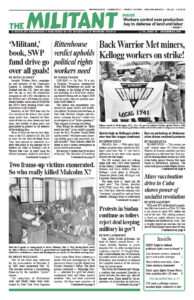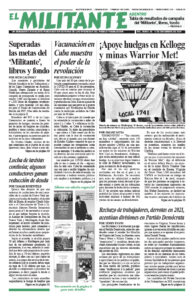Below are excerpts from the Socialist Workers Party 2007 resolution “The Stewardship of Nature Also Falls to the Working Class: In Defense of Land and Labor.” It is available in issue no. 14 of New International, a magazine of Marxist politics and theory.
Labor’s transformation of nature is the source of all wealth, all advances in social productivity, culture, and conservation. It is the very foundation for the ongoing existence of our species.
At the same time, from the earliest stages of class-divided society, the propertied classes have organized labor to advance their private gain. They have done so with no concern for the social consequences of their methods. The exploiters use labor as an expendable beast of burden, while they simultaneously deplete the soil, destroy forests through slash-and-burn or other farming methods, wipe out animal life through overhunting and overfishing, and poison streams, ponds, and other bodies of water.
Thus, over the thousands of years since the rise of private property, the relationship between social labor and the natural environment has been marked by the mutually contradictory poles of transformation and destruction. …
The capitalist mode of production dominant for the last few hundred years, however, takes on its own particular lawful historical forms and tempos, with ruinous consequences for the producers of wealth themselves. Under capitalism neither nature, tools, nor machinery; neither science, knowledge, nor technique add directly to the value created by workers and appropriated by the exploiting class. The store of value is increased only through the transformation of land and other natural resources by human labor, the use of tools and machines by workers, the toilers’ application of science, knowledge, and technology.
By incorporating the two primary sources of wealth — labor-power and land — Marx observed, “capital acquires a power of expansion that permits it to augment the elements of its accumulation beyond the limits apparently fixed by its own magnitude.” In fact, capital is forced to extend its reach over nature and labor by the cutthroat competition of the system itself and by the workers’ fierce resistance bred by this exploitation.
In just a few hundred years, capitalism — initially germinated in a few parts of Europe — has employed that “power of expansion,” reinforced by military might, not only to engulf the vast majority of the earth but to contaminate its lands, seas, and atmosphere and to extend finance capital’s armed dominion into space.

